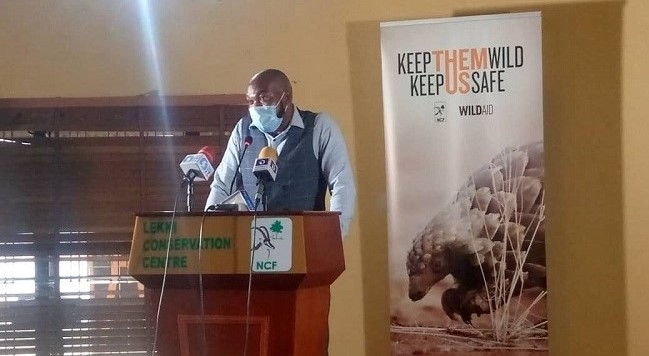WildAid, a non-profit organisation saddled with the responsibility of ending illegal wildlife trade, has asked the Federal Government of Nigeria to educate its citizenry on consequences of the illegal trade and consumption of wildlife.

Making this call at a press conference in Lagos on Tuesday, January 12, 2021, Linus Unah, the West African Representatives of WildAid, suggested that Nigerians turn to widely available and affordable protein sources as alternatives to consumption of bushmeat.
According to him, wildlife in Nigeria could go extinct If illegal consumption and trade continue.
He further highlighted the need to educate Nigerians residing in urban areas on the risks of contracting the diseases linked with purchasing and consumption of wildlife.
“We need to educate urban Nigerians, who typically live far away from forests where bushmeat is often harvested, about the risks of zoonotic disease, the conservation impact of the bushmeat trade and the fact that current wildlife laws prohibit the hunting and trade of several species.”
Also speaking at the press conference, Peter Knights, the Chief Executive Officer of WildAid, pointed out that about 75 per cent of diseases in the world originates because of consumption of illegal trade and of bushmeat and other wildlife.
Further stating that putting an end to illegal wildlife trade and consumption was not just about the endangered species, Knights explained that it had so much more to do with the protection of human health and economy.
“75 per cent of the new diseases are believed to originate in animals.
“In recent years we have seen very serious disease outbreak emanating from wildlife; HIV AIDS came from monkeys to chimpanzees via to bushmeat trade to human beings.
“Stopping illegal wildlife trade is not just a matter of concerns of the endangered species but also protecting human health and human economies, as we’ve seen with COVID-19.
“So, this work is becoming very urgent, and we hope that COVID-19 will serve as a wakeup call to the world about how we treat our wildlife going further into the future,” he said.
Mark Ofua, a veterinary doctor dedicated to saving animals and sharing knowledge on animal conservation who also spoke at the press conference, stated that there is a price to pay for every animal that goes extinct.
According to Ofua, every animal plays a role in ensuring that there is a balance in the ecosystem.
“One thing about these animals is that it is very clear that in a little while they will become extinct.
“Sadly, we have a few of these animals that have already become extinct.
“When we say protect wildlife, we are actually saying protect us.
“Every animal in the wild has a role it plays, when you remove that animal from that role, there is going to be a cascade problem. Recently in India.
“For any animal that goes extinct, there is a price to pay,” Ofua said.
The vet doctor also pointed out the need to educate locals on the concept of extinction and zoonosis.
“A whole lot will have to be done on education; I think that is where the primary need is education. The locals, the hunters, the traders, the poachers I have spoken with all levels of people with involved in this illegal trade and this is their perception.
“Firstly, they do not have that concept of extinction, they do not believe that wildlife can be extinct. They believe the animals were put in there by God for us to hunt and eat or make use of and it is God that replenish them it can never get finished.
“Secondly, they do not believe that we can get diseases from animals. They think the concept of zoonosis preached by the government first with Ebola and then with COVID-19 is a gimmick by the government to get them off the source of their livelihood,” Ofuwa said.
The press conference was organised to officially launch WildAid’s bushmeat survey in Nigeria.
The survey, which sought to guide future conservation initiatives by establishing baseline data on attitudes, values, motivations and behaviours of urban buyers, users and intended users of bushmeat, uncovered that the trade and consumption of bushmeat and other wildlife is rampant across Nigeria.
In the cause of the survey which sampled about 2,000 respondents from September to October 2020 across four major cities in Nigeria, it was discovered that over 70% of urban Nigerians have consumed bushmeat at some point in their lives and 45% consumed it within the last one year.
Also, in the cause of the survey, it was discovered that taste is a major factor influencing urban bushmeat consumption, with about 51% of bushmeat consumers indicating that it is one of the primary reasons for their choice.
